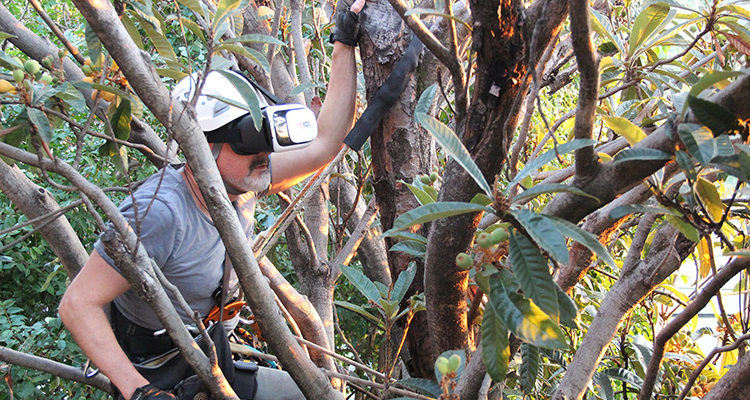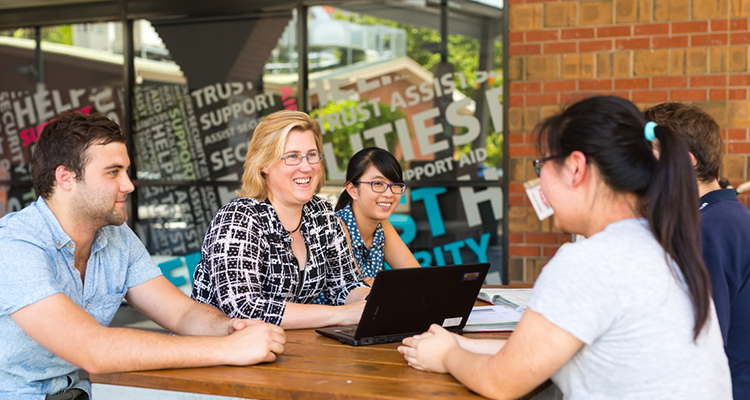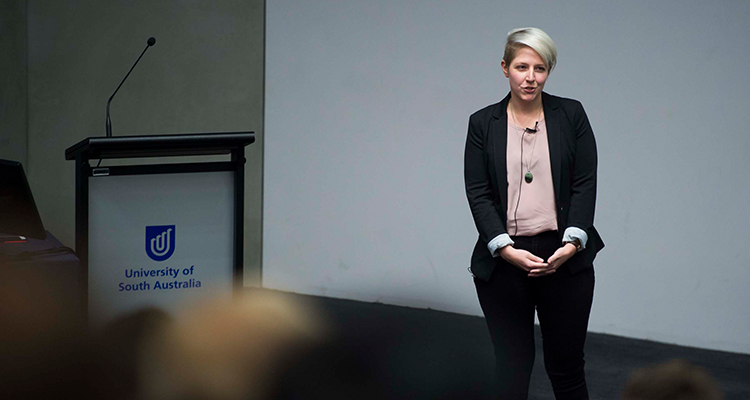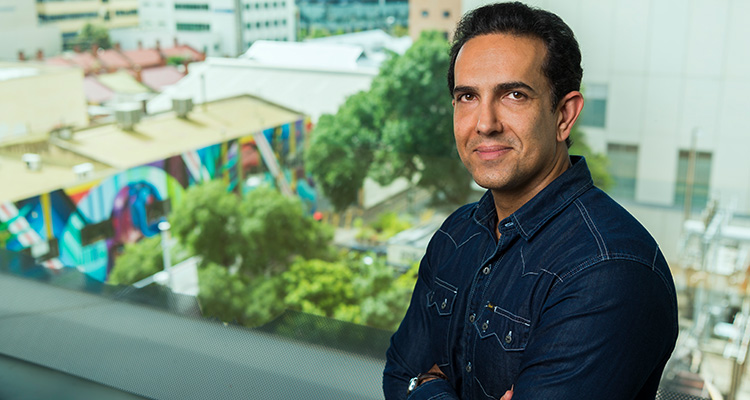What is a research degree?
A research degree is an advanced program of study allowing you to investigate a topic with relevance to your field. Under the supervision of world-class researchers you will learn and apply advanced research methodologies to produce new knowledge and provide solutions to challenges within your discipline area.
Completing a research degree means becoming an expert in your field. It’s your opportunity to take a topic that interests you, explore it in depth, tackle intellectual, creative and practical challenges, and communicate your findings. You will also find by undertaking a research degree you will:

Challenge yourself
You will need to work hard, be dedicated and think analytically at a high level.
Tackle completely new research and different research methods, or extend research already undertaken.

Expand your career opportunities
A research qualification provides evidence of independent thought and the ability to manage a research project in a given timeframe.
Your research could allow you to develop a new specialisation, academic field or career.

Make your ideas public
Your research findings may be published, presented at conferences, provide a commercial return and have a positive impact on society.

Contribute to society
Discover new methods, understandings and techniques, and solve a real-world problem.
Choice of research projects
We offer research projects across a wide range of disciplines. You could complete a Doctor of Philosophy (PhD), a Master of Research, or a professional doctorate in Education.
Doctor of Philosophy
Doctor of Philosophy (PhD) programs (up to four years full-time equivalent), provide training and education with the objective of producing graduates with the capacity to conduct research independently at a high level of originality and quality. By the end of the degree program, the PhD candidate will be capable of independently designing and executing original research that generates new knowledge.
Professional doctorate
A professional doctorate (three to four years full-time equivalent) is a rigorous program of advanced study and research, designed specifically to meet the needs of industry and professional groups in particular disciplines. Professional doctorates usually consist of a blend of coursework and research.
Master of research
Master of research programs (two years full-time equivalent) aim to train candidates in analysing their thesis topic at an advanced level, applying research methodology and techniques to contribute new knowledge to their field, under appropriate supervision.
-
Read more about UniSA research degrees
Expert supervision and candidate support
Every research candidate is supported by a supervisory panel consisting of expert academic supervisors, and enabling multidisciplinary expertise and end-user advisors from outside of the University.
In addition to their supervisory panels, research candidates are supported by staff in their school, and by services centrally. Regular planning, review and other quality assurance processes promote success.
Research performance
Through our research excellence, we create knowledge that is central to global economic and social prosperity. Ranked in the top 2% worldwide*, we continue to set the pace for world-class research and solutions for a changing world.
*The world University Ranking 2016-17, International Handbook of Universities 2017.
Financial support and scholarships
The University of South Australia offers many opportunities for research students to be supported financially to pursue their research degree.
Please note: living allowance scholarships are associated with a research project, usually for full-time students. When applying to do a research degree, you will need to apply for a project (and associated scholarship if applicable) as listed on the research projects page.
In addition, there are other scholarships offered by the University of South Australia, including:
- University of South Australia Postgraduate Awards, Indigenous Scholarships, and Rural and Isolated Scholarships for Australian applicants
- University President's Scholarships for international applicants
- Vice Chancellor and President's Scholarships for top scholarship recipients
- Funding opportunities linked to specific areas or projects
- Funding for travel and to support the completion of your degree
Find out more about funding opportunities to support your research degree.
National and international partnerships
Multidisciplinary teams work with industry, government, other education providers and the professions, nationally and internationally, on projects relevant and beneficial to industry and the community.
Opportunities also exist for collaborative PhD programs with Australian and international partners.
South Australia - the perfect place to study
Named in the world’s top 10 regions to visit in the Lonely Planet guide’s 2017 Best in Travel collection, South Australia is one of Australia's best-kept secrets. UniSA is located in the state’s capital city, Adelaide – a city surrounded by parklands, pristine beaches, and the lush green hills and valleys of Australia’s premier wine regions.
With a population of just over one million people, Adelaide is renowned for its affordability and quality of life. Ranked in the top five of the world's most liveable cities in the 2017 Economist Intelligence Unit's liveability survey, it’s the perfect place to base yourself in during your studies.
Each year, South Australia hosts more than 400 food, arts and cultural events, as well as a number of prominent sporting events such as the Santos Tour Down Under cycling race.
It’s a beautiful and vibrant place to call home.
Collaborative PhDs
Collaborative PhDs provide an opportunity for enriching the PhD experience. PhD candidates at UniSA can collaborate in a number of ways.
-
Read more about Collaborative PhDs
University Collaborations
Collaborative PhD programs with other universities include joint and dual award programs, and cotutelles with French partners. These programs are established where there is existing research collaboration.
Candidates taking part in a collaborative PhD spend time at each institution, and their supervisory panel includes supervisors from both partners. On successful completion of their PhD, candidates graduate with a single PhD qualification granted by both institutions. This may be evidenced through separate parchments from each university which cross-reference each other, or through a single parchment bearing the crests of both universities.
The objectives of a Dual Award, Jointly Badged or Cotutelle PhD include:
- Enhanced opportunities and quality of the research training environment for research candidates, including increased opportunities to gain experience and exposure to different cultural and university environments and to create professional links at an early stage of their careers
- Attracting high quality PhD candidates
- Increased research collaboration between UniSA and strategic partner institutions.
We have collaborative PhD programs with high quality Australian and international universities in a range of disciplines, including (but not limited to) marketing, public health, engineering and sociology.
Prospective candidates interested in participating in one of our existing collaborative PhDs should discuss this with their intended UniSA supervisor.
For more information about PhD Program Collaboration view the policy here. Staff information is available on the PhD Collaboration website (Staff access only).
Industry Collaborations
Candidates have a variety of opportunities to collaborate with industry during their research degree, including:
- Participation in the Australian Technology Network Industry Doctoral Training Centre
- Engagement with mentoring, placement and internship schemes
- Working on collaborative industry projects with their supervisor and research group.
Collaborative Scholarships
UniSA has invested in Research Themes PhD Scholarship - supporting research candidates to work across traditional boundaries with in the university and externally with partners to address research grand challenges.
In addition, UniSA supports and administers a number of industry funded scholarships for candidates to work, in collaboration with partners, on specific research projects.
Short term research opportunities
If you are a senior undergraduate student, postgraduate student or research degree student from a university/institute in Australia or overseas, you may be able to undertake a short-term research project in one of the University's research concentrations.
-
Read more about short term research opportunities
The University of South Australia offers research experience opportunities to help you develop skills relevant to your tertiary education, occupation or field of study. Projects can last from 1–12 months. You will carry out research tasks under the supervision of an academic supervisor. You may be required to provide written and verbal progress reports outlining the work you undertake and the results you achieve.
To participate, you must:
- be in the final stages of an undergraduate degree, or undertaking or having recently completed a Masters or PhD qualification
- have a high-achieving academic background specifically suited to the research project in which you will participate.
Travel and health insurance
As an overseas visitor, you are responsible for the booking and cost of all travel arrangements, including visas. You must have adequate personal travel/health insurance cover for the duration of the visit.
Steps and documentation
- Check the University's research concentrations to ensure your study interests correspond.
- Contact the relevant research concentration to discuss your suitability for and availability of a project.
- Forward your CV and a recent language certificate confirming your English language ability to the contact provided by the research concentration.
Contact
For further information, please liaise with the contact for the research concentration relevant to your study interests.



